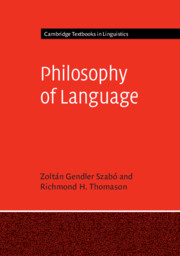
-
Select format
-
- Publisher:
- Cambridge University Press
- Publication date:
- October 2018
- November 2018
- ISBN:
- 9781316156353
- 9781107096646
- 9781107480629
- Dimensions:
- (247 x 174 mm)
- Weight & Pages:
- 0.76kg, 338 Pages
- Dimensions:
- (247 x 174 mm)
- Weight & Pages:
- 0.61kg, 338 Pages
You may already have access via personal or institutional login
Book description
This unique textbook introduces linguists to key issues in the philosophy of language. Accessible to students who have taken only a single course in linguistics, yet sophisticated enough to be used at the graduate level, the book provides an overview of the central issues in philosophy of language, a key topic in educating the next generation of researchers in semantics and pragmatics. Thoroughly grounded in contemporary linguistic theory, the book focus on the core foundational and philosophical issues in semantics and pragmatics, richly illustrated with historical case studies to show how linguistic questions are related to philosophical problems in areas such as metaphysics, epistemology, and ethics. Students are introduced in Part I to the issues at the core of semantics, including compositionality, reference and intentionality. Part II looks at pragmatics: context, conversational update, implicature and speech acts; whilst Part III discusses foundational questions about meaning. The book will encourage future collaboration and development between philosophy of language and linguistics.
Reviews
‘This rich textbook fills an important need. It will provide indispensable background in philosophy of language for anyone interested in the modern linguistic study of meaning. Linguists and philosophers alike will benefit from Szabó and Thomason's skilled guide to foundational issues.'
Kai von Fintel - Massachusetts Institute of Technology
Contents
Metrics
Altmetric attention score
Full text views
Full text views help Loading metrics...
Loading metrics...
* Views captured on Cambridge Core between #date#. This data will be updated every 24 hours.
Usage data cannot currently be displayed.
Accessibility standard: Unknown
Why this information is here
This section outlines the accessibility features of this content - including support for screen readers, full keyboard navigation and high-contrast display options. This may not be relevant for you.
Accessibility Information
Accessibility compliance for the PDF of this book is currently unknown and may be updated in the future.


